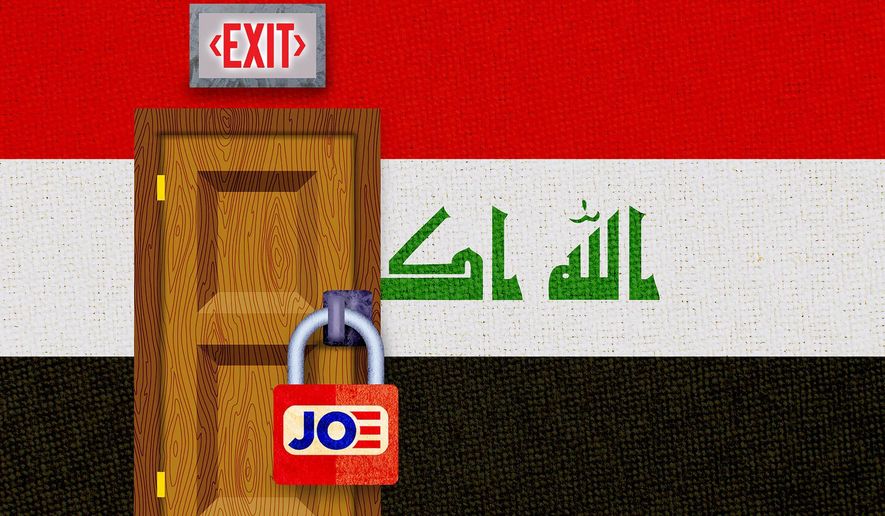OPINION:
After a meeting with Iraqi Prime Minister Mustafa al-Kadhami on Monday, President Biden announced that U.S. troops are not “going to be in a combat zone by the end of the year.” Instead, he explained, the U.S. military’s role will shift to being “available, to continue to train, to assist, to help and to deal with ISIS as it arises.” In other words, virtually the only thing that will change is the title placed on the troops.
That’s bad news for America.
Before leaving Baghdad, Mr. Kadhimi was unequivocal in saying that his troops could secure their own country. “There is no need,” Mr. Kadhimi declared, “for any foreign combat forces on Iraqi soil.” Both Biden and Kadhimi seem to be emphasizing the word “combat” in that sentence, as there appear no problems for either leader in having U.S. uniformed service members on Iraqi soil so long as they are called “training” troops.
The truth is, Iraq’s troops are capable of providing for their own security. I can fully understand why Mr. Kadhimi would want to keep American troops in Iraq, as we possess significant combat capabilities from which the government in Baghdad would benefit. Neither leader addressed – and thus far neither has anyone else at the Pentagon and White House – is how this perpetuation of the status quo is in America’s security interest.
The reason no one in a position of authority has broached this subject is clear: There are no security interests at stake for the United States in Iraq. The only benefactor is the government in Baghdad. For Washington, the mission represents a continuation of an unseemly status quo: All risk and no benefit.
Make no mistake, regardless of what tag anyone wants to place on our uniformed troops in Iraq, they are in a combat zone and will remain in harm’s way even after having their title change from “combat” to “trainers” at the end of the year. Thus far in 2021, there have been over 50 rocket and armed drone attacks against U.S. troops in the region. Mr. Biden has twice launched punitive strikes against the Iran-backed militias allegedly behind some of those attacks.
Predictably, after each strike, the militias vow revenge attacks for each strike and target U.S. personnel in Iraq in response. As evidenced by the most recent attack against an Iraqi base housing U.S. personnel just days ago, those attacks will continue. Thus far, no Americans have been killed in the many recent attacks. Still, Mr. Biden has come under increasing pressure to strike harder and bigger in response to the attacks.
If one of those militia rockets lands on target, however, and an American is killed, Mr. Biden will most likely come under bipartisan pressure to strike not just militia sites in Iraq and Syria but potentially into Iran itself. No American president could sit passively by if American service personnel are killed. Congress and the public would demand retaliation. But carrying the fight into Iran would dramatically increase the risk of stumbling into a series of escalating measures that could all too easily spiral into a new war.
The best thing Mr. Biden could do to strengthen American national security would be to completely withdraw from Iraq and Syria by the end of the year. Doing so would not add any risk to our national security, as our global ability to launch powerful and targeted strikes against direct threats to our country would not be affected by such withdrawals.
Further, Iran is a weak state in comparison to the United States. Withdrawing our troops from Iraq deprives Tehran of its easiest opportunity to hurt Americans: by striking our troops in its region through proxies. Aside from its inherent weakness vis-à-vis America, Iran is presently racked with a spike in covid cases that have locked down much of the capital, suffering widespread anti-government protests against the mullahs’ rule, and a major drought in the country’s southwest.
The gulf between American and Iranian power has rarely been larger than it is now. There is no threat they pose which we cannot readily handle. Deprived of the convenient proximity of having U.S. troops deployed in Iraq and Syria, Iran is virtually powerless to inflict even minor harm to the United States and will remain strongly deterred.
America’s influence and power rest on the strength of our global economy and the dominance of our conventional and nuclear forces – none of which Iran or its militia can threaten. Iraq is capable of defending its own territory and should shoulder full responsibility for its security. Therefore, the safest, most responsible strategy for Washington to pursue is a full withdrawal from Iraq and Syria.
• Daniel L. Davis is a Senior Fellow for Defense Priorities and a former Lt. Col. in the U.S. Army who deployed into combat zones four times. He is the author of “The Eleventh Hour in 2020 America.” Follow him @DanielLDavis1.




Please read our comment policy before commenting.